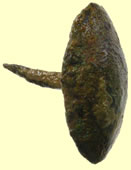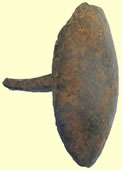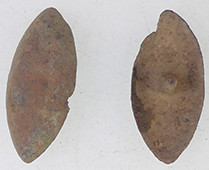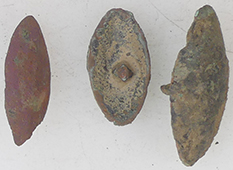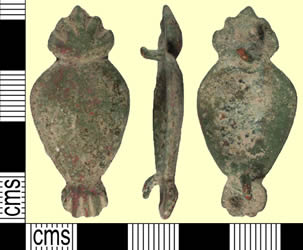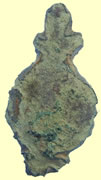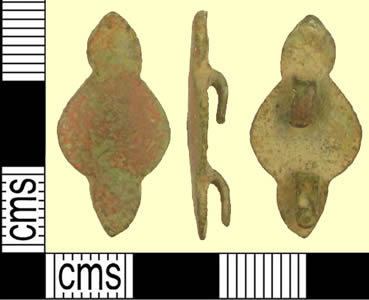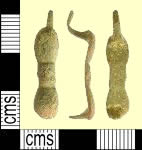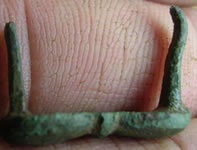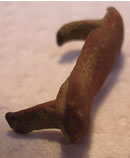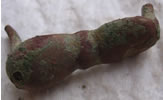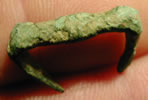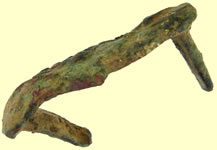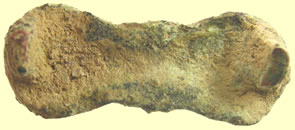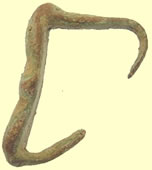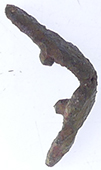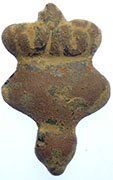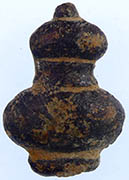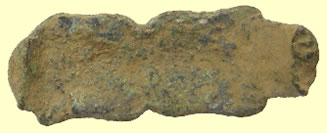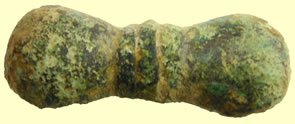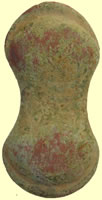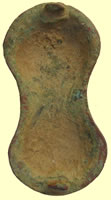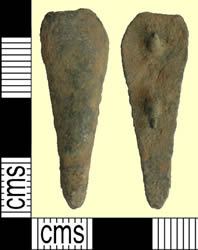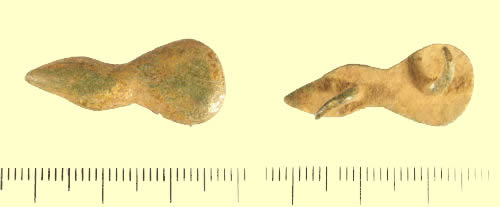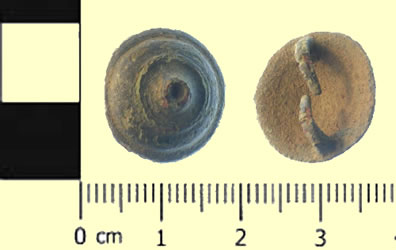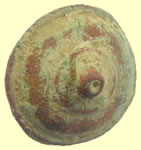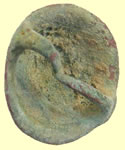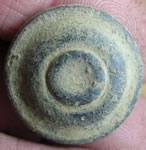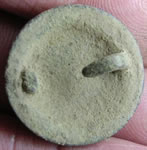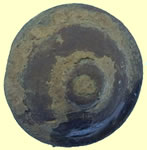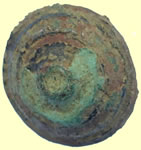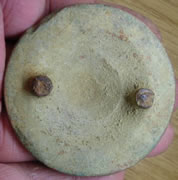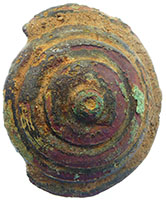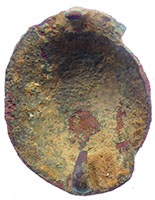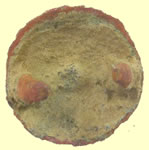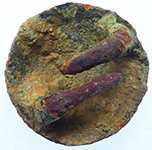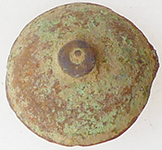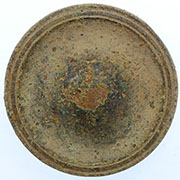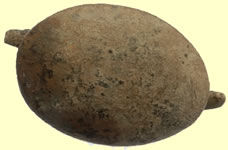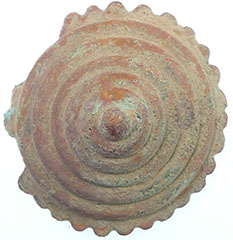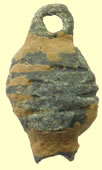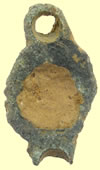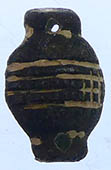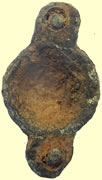

Metal detecting holidays in England with the World's most successful metal detecting club.20 years plus.
Twinned with Midwest Historical Research Society USA.
Mounts- oval shaped |
 Cast copper alloy mount of probable late medieval or post medieval date (1400-1600). The mount is sub-oval in plan and domed in cross section (D-shaped). The front face is convex and undecorated, however it decorated with an applied surface – probably tin . The edges are slightly raised and have a thicker cross section. The reverse is concave. From a central position a small square sectioned spike projects; this is broken relatively close to the body of the mount. The mount is a dark mid green colour with a patchy surface patina. The length of the spike would suggest that this mount was used either in a piece of furniture or through a relatively thick piece of leather, possibly on horse harness. It is unlikely that it would have been used for personal dress. The mount measures 16.7mm length, 8.5mm maximum width, is 6.7mm thick and weighs 1.34 grams Broad period: MEDIEVAL Period to: POST MEDIEVAL Date from: AD 1400 |
  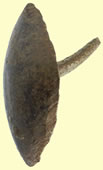 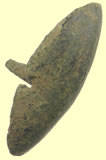   |
  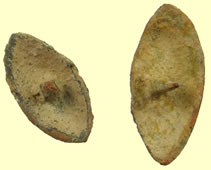 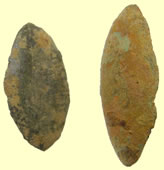  |
|
Post Medieval cast copper alloy mount dating to the 16th - 17th century. The mount has an roughly piriform (drop shaped) front with projecting knops top and bottom. The mount and knops are convex with a concave back and there are thinned constrictions between the centre and knops. The knop at the top is larger, triangular with four incised lines on the front and a scalloped outer edge giving the effect of five rays; The lower one is oval with four incised lines which are more parallel and again a scalloped outer edge. On the reverse there are the stubs of two integral but broken spikes, one each at the necks where the knops join the centre. ChronologyBroad period: POST MEDIEVAL Materials and constructionPrimary material: Copper alloy Manufacture method: Cast
|
    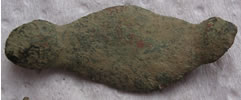
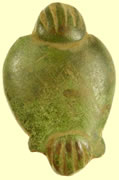 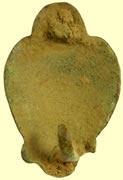
|
17th century cast copper alloy symmetrical flat mount with two integral lugs on the back. Plain circular body with trilobed moulding at either end. One of the mouldings is missing. ChronologyBroad period: POST MEDIEVAL Date from: Circa AD 1600 Dimensions and weightLength: 28 mm Materials and constructionPrimary material: Copper alloy Manufacture method: Cast
|
|
An cast copper alloy mount of post-Medieval date (1600-1700). In plan, the mount is in the form of to sub-oval terminals, bulbous at the front. Several are divided by a smaller sub-rectangular feature at the centre consisting of three transverse parallel ribs Broad period: POST MEDIEVAL Period to: POST MEDIEVAL Date from: AD 1600
|
Cast copper alloy belt mount with two rivets. The mount is sometimes subdivided by a single groove at a position of 6m from the sharp end. Both rivets are usually bent to a semi circular shape. The lower surface can be flat while the upper is moulded ChronologyBroad period: MEDIEVAL Primary material: Copper alloy Manufacture method: Cast
A gilt copper alloy strap mount. In plan the mount comprises two pointed oval areas, one being smaller than the other. The body is convex and on the reverse are two integral inward pointing arms. ChronologyBroad period: POST MEDIEVAL Dimensions and weightLength: 28 mm Materials and constructionPrimary material: Copper alloy Manufacture method: Cast Surface Treatment: Gilded
A copper alloy circular strap mount that probably dates from the post Medieval period. It is domed with a central raised circular stud and decorated with concentric circles. It has been tinned. The reverse has two integral spikes that have been bent over to grip the leather to which it was attached. It has a diameter of 16.6mm, thickness 9.8mm, weight 2.66g. Class: strap mount ChronologyBroad period: POST MEDIEVAL Date from: Circa AD 1500 Dimensions and weightThickness: 9.8 mm Materials and constructionPrimary material: Copper alloy Manufacture method: Cast
A Medieval copper alloy barrel shaped bar mount, dating to the period c.AD 1350-1400 The mount consist of a sub-oval dome, convex on its front, concave on its reverse, with sub-rectangular projections at opposing ends, housing holes for rivets (c.<1mm in diameter) both of which still contains copper alloy rivets. The front of the dome is decorated with four incised lines that run horizontally across the dome with shallow transverse lines incised over the ridges between these. The reverse is plain. |
|
|



